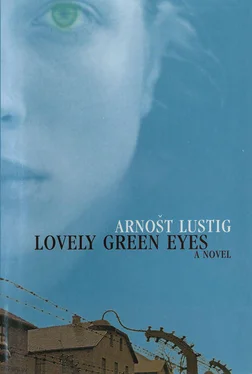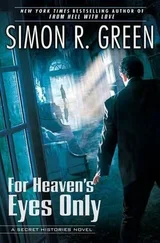“I hope I won’t be hungry. But I have nothing against dreams about food.”
“Dreams don’t forget,” said the rabbi.
“And I’d give a lot to be able to forget.”
“You are still innocent.”
“It would be nice if that were true.”
She swallowed another mouthful. “While I have something to eat and a roof over my head, an open larder, food on the table three times a day, a bath full of hot water, and no longer the fear that I could lose all that at any moment, I don’t feel I have anything to complain about.”
She added: “Here I don’t feel envious of anyone else.”
“You’re a grown-up child,” said the rabbi.
“Is that a good thing?”
“It’s not a bad thing.”
“I don’t know, I really don’t,” she said again.
“Nothing is any longer only good or only bad.”
“It’s better not to look back.”
“Can you manage that?”
“I’ll have to,” she answered.
He was watching her intently as she ate with gusto. She was pretty the rabbi noted, but too thin. She would grow, he told himself, she was still so young. At the same time she had been damaged beyond what was visible, countless times violated and humiliated and whipped.
He could find no words to express this, or numbers to sum it up. He guided himself by the cabbala, in which the sum of one plus one was three. Twelve, 13, 15, 21 days. Not even the cabbala had a solution for such numbers. They remained a mystery.
“You must be hot,” Skinny said.
“Ill undo my jacket.”
“You could open the window if we switched off the light.”
“Not till it’s night.”
“I’m no longer afraid.”
“That’s good. You’ve nothing to be afraid of.”
They both knew that this was not entirely true.
She has beautiful green eyes, Rabbi Schapiro thought to himself. His wife and daughter had had such eyes.
“Go on, eat,” he encouraged her, to prove to himself that he could still speak.
“Thank you. I’ve had all I can eat.”
“Have some honey.”
“I’ve had some.”
“You’ve a lot of catching up to do.”
“Something, certainly.”
“Three or six years?”
She smiled at him like a child at an adult or an adult at a child.
“Our ship sank,” he said. “Only some scattered shipwrecks survived.”
He looked at her carefully combed ginger hair, parted in the middle and still damp from her bath.
“Our train was derailed,” he continued. “The brakes, which used to function, failed.”
“Time I went to bed,” Skinny said. She would wash his shirts in the morning, she decided, even though it was the Sabbath. She would get it done before he woke.
“You should eat something before going to bed,” she said. “It doesn’t do you any good to only drink. I saw people in the camp who didn’t eat even the little they could have eaten.”
He did not ask her why, but if he had, she would not have told him that they had lost the will to live. Was the rabbi afraid that perhaps the war was not over yet, that some part of it might come back? She was looking forward to the moment when she could take off the clothes, underwear and woollen stockings that had belonged to Erzika. Was he waiting for the candle to burn down? Face to face with Skinny the rabbi felt older than the world, older than the stars and infinity. Older than the cabbala and all the sacred books. Older than the hidden meaning of all things. He was afraid to return to the faded meaning of the laws, precepts, customs and ceremonies. To the guiding principle ofhis religious and civic life. To the exegesis of the great prophets, to that which had not been published in print but which the girl in the tall chair in front of him had gone through.
God, Rabbi Gideon Schapiro said to himself, why have you taken away our pride and exposed us to contempt? Why have you driven us out of the light into darkness, us, your Chosen People? Why did you make the exalted low, the noble rotten, why did you deprive the wise of their reason, the weak of their strength, the desperate of their hope? Why did you permit the enemy we did not know to oppress us like the lowest of slaves? Why did you not let us sleep on that first night they humiliated and dishonoured us, never to awaken again? Why did you make us keep a soul in a dead body?
“It’s gone,” the rabbi whispered.
He sounded confused to her again. What was gone? She had no idea that the rabbi was referring to his soul. She had seen a lot of people in that state. She didn’t say anything, she didn’t even move, she just let the rabbi unburden himself.
“I’d like to say that we are rising from the ashes,” the rabbi said feverishly, “but we are drowning in them, you and I.”
Was the mountain of ashes so big that it had drowned their God?
“I’m free from it,” she assured the rabbi.
“You’re not.”
“Yes, I am,” she insisted. “I am with you.”
“Perhaps you will be free one day.”
“I’m sure of it.”
“As sure as there’s a heaven above me.”
“If that’s what you want to hear.”
The old grandfather clock struck ten — their usual bedtime. The rabbi blew out the candle.
“It’s stopped raining,” he said.
“Yes,” she said. “It’s stopped.”
She was happy she didn’t have to get up at 4.30 a.m., but could sleep until the light woke her. There would be no Oberführer sounding an alarm.
She waited for the rabbi to rise from his chair and then rose herself. His legs were shaking, but she pretended not to notice. That tenth day with the rabbi had made her see how a person lost his mind, how he could be seized by insanity like an invisible rain falling on parched ground.
He did not want to be locked in a world into which he had been forced by what had happened, yet at the same time he could not get into the world he didn’t understand. These two worlds were confronting one another in his head like two tanks, or like two warships sailing towards one another in the dark of night. The line on his forehead had deepened and perspiration was collecting in it. In his dark eyes a madness had taken root, flushed up by tears, but a madness with which one could live. Rabbi Gideon Schapiro was weeping again.
She left on the eleventh day, when she felt she should go and it seemed safe. The rabbi looked on her as on Mount Everest that could not be climbed, as on the Pacific Ocean that could not be swum, as on the abyss of all time. He felt dizzy, perhaps because he had not eaten properly for ten days. She had mostly been eating by herself. He fasted, wanting to starve as she had done. She had put on weight during her stay with him, she had filled out a little, though not much. Her silky, ginger hair had grown again.
He gave her a gold pocket watch on a chain, which played the Hungarian anthem. He had two — one had belonged to Elsa and the other had been his daughter’s. The latter he had traded with the baker for bread. He saw her to the door. He had not been out in the street for ten days.
She went to the station, to meet the two railwaymen who had taken her to the rabbi. One of them gave her a pair of high lace-up boots with metal studs. They would last her some time.
“Yes, God is within you,” the rabbi had said at the door.
These were the last words that Hanka Kaudersovâ would hear from Rabbi Gideon Schapiro.
We were sitting in a café in Prague. Skinny was telling her story in bits and pieces.
There had been nights when she couldn’t sleep and when she imagined how time had slowed down for people in the gas chamber, when they could no longer breathe and every fraction of a second seemed endless. She would ask herself what right she had to live when all those she had known, including her mother and father, her brother and uncles and grandmothers and aunts and grandfathers, were no longer alive. It remained with her for a long time, as a cry whose echo did not fall silent. She had dark circles under her eyes, as she’d had in No. 232 Ost. She was paralyzed by the shadows cast by what she had behind her and before her.
Читать дальше


![Корнелл Вулрич - Eyes That Watch You [= The Case of the Talking Eyes]](/books/32103/kornell-vulrich-eyes-that-watch-you-the-case-of-thumb.webp)









